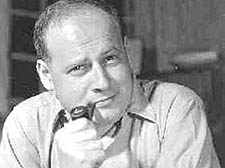|
|
 |
| |

Gerard Hoffnung |
In harmony with
a vacuum cleaner
An irreverent and mischievous attitude to music made Gerard Hoffnung a much-loved favourite with audiences, writes Ruth Gorb
IN pride of place in Annetta Hoffnung’s Hampstead living-room is a large and immaculately polished tuba.
She has five tubas in the house, but this one is special: it is the one that she and her husband Gerard bought together at Boosey and Hawkes in 1952.
“He always loved music,” she says. “The loud stuff.”
Gerard Hoffnung – music-lover, music-maker extraordinaire, artist, humorist – died 50 years ago, aged only 34.
His work endures because he was unique. He was also a genius, a genius who brought vacuum cleaners and floor-polishers into orchestras and had concert audiences howling with laughter.
This was the man who brought new meaning to a performance of Haydn’s Surprise Symphony: in the Andante, a sudden gush of beer from a tap in the euphonium was rather more than the sedate concert-goers bargained for.
The wild, inventive jokes were embraced with delight by the musical establishment. And a wider audience fell in love with his wacky cartoons, beautifully drawn and with a unique view of the world, often grotesque but never cruel – although in his youth he was expelled from Hornsey School of Art by authorities who thought he wasn’t taking the life class seriously enough: his mischievous drawing of the back view of the model does make their point.
The irreverence that got him into trouble as a boy was the making of him. A portly figure, balding and bespectacled, with an idiosyncratic high-pitched voice, he was one of the best-known and best-loved figures of the 1950s – he was a star of radio programmes such as One Minute Please (the precursor of Just a Minute) and his excruciatingly funny speech at the Oxford Union in 1958 when he told his Story of the Bricklayer was recorded by the BBC and has become a classic.
He was born in 1925 in Berlin to Jewish parents, his mother a cultivated woman who took her talented child to live in Florence, not a good idea in the 1930s. The family moved first to Israel and then to join Gerard’s aunt in Hampstead Garden Suburb where Hoffnung was to live for the rest of his life.
He went to Highgate School, where his reports were appalling but where he had his first cartoons accepted by the then widely read magazine Lilliput.
He taught art and German at a public school in Lincolnshire (where the writer Colin Dexter was one of his pupils) and continued to have artwork published in several now- defunct magazines.
But music, although he had no musical training, was his great love, and he proceeded to make music and devise concerts as no one had ever done before. “He didn’t visit the Festival Hall,” said one critic. “He invaded it.”
Since her husband’s death, Annetta Hoffnung has taken Hoffnung concerts all over Europe, to Canada and Australia, and to the Hollywood Bowl in Los Angeles.
Has her life, one is tempted to ask, been devoted to keeping Gerard’s memory alive? She looks appalled. “I could never have done that. “His work has kept his memory alive.”
•
|

|
 |
| |
|
 |
|

